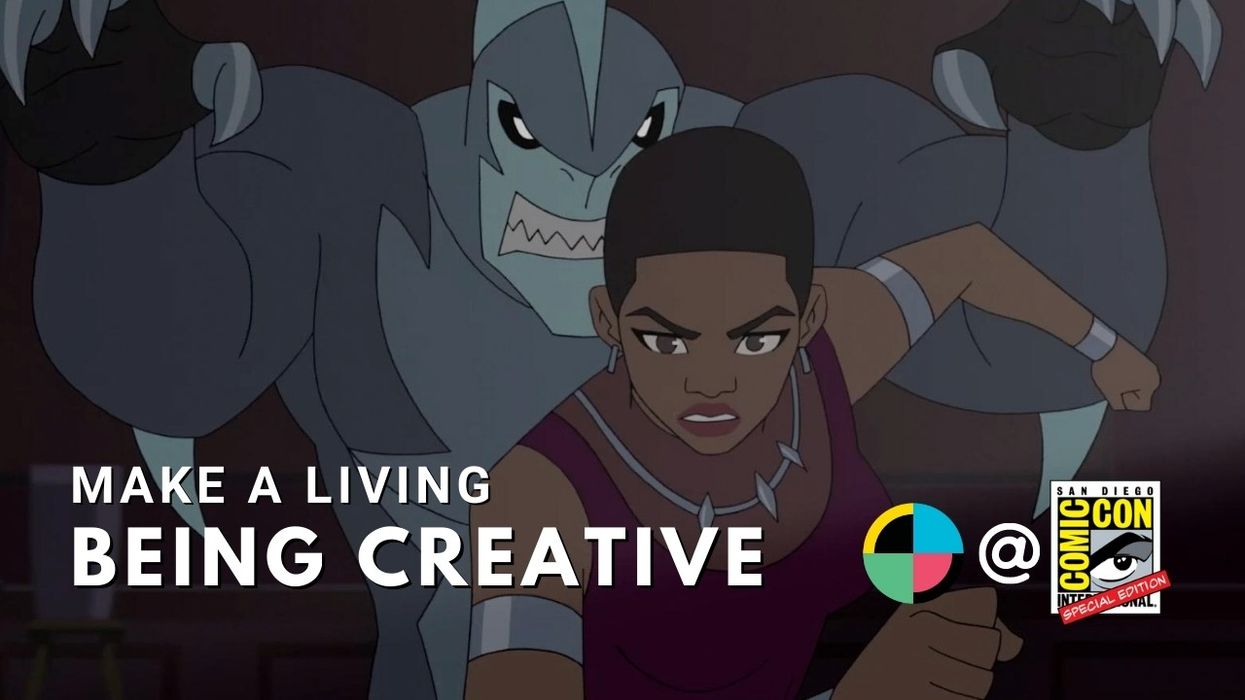
I think we can all agree that we're coming to this website and attending events like Comic-Con because we want our full-time jobs to be artists. Whether that's writing, directing, cinematography, producing, or even drawing and painting, trying to forge a career in the arts can be incredibly hard. Making a living might be even harder. It would be amazing to be able to have a house, support a family, and maybe even have one of those white picket fences we've seen on TV.
So how can you make a living being creative?
I sat down for this panel at San Diego Comic-Con excited to hear from the experts. The panel discussing the problem included storyboard artist Jess Cuffe (Spider-Man, Avengers Assemble) and illustrator Lee Kohse (Star Wars, Kindergoth, Transformers). The panel was moderated by Johnny Kolasinski (Roddenberry Productions, Hey Everybody: A Bad Medicine Podcast). While they don't necessarily work in film and television, which the majority of our audience wants to be, I think comics and film/television have a lot in common, especially in sentiment.
Listening to them discuss the business of being creative and the various ways you can earn a living while having fun was very fruitful. Like many of us, the big lessons they had to learn were about how to break into the industry, how to promote themselves, how to network, and how they rose up the ladder. It was super interesting.
When it comes to advice, most of it starts with buckling down. School is one pathway into any career. But you can self-teach yourself pretty much anything with the internet. Get busy on YouTube and Google seeing what free resources are out there. Without curiosity, you're going to get nowhere.
The best artists are always trying to learn how others do things. You need to develop your own voice, but imitation is the key to learning. Be okay learning how everyone else is doing it before you set off to do it yourself.
Much like television, people want to hire someone with their own voice, but they also want to know you're willing to take notes and mold your work to what they want. When you meet people, be collaborative and also interested in what they do. They call this "drawing in the style, while also drawing outside of the box."
This applies to our readers who want to shoot like Fincher, but need to set themselves apart from what people like Fincher do—what makes you, you?
It sounds cheesy, but the power you have is really within becoming yourself. What you have to say and show will be your ticket. It'll also be what you market. Your point of view is valuable. Your life experience is unique, and it'll be what gets you hired, outside of having good samples.
Now let's talk about the elephant in the room... money.
Let's say you've done all the things you're supposed to do. How do you get paid now? You have a voice and samples, so where is the money?
One of the hardest parts of all this is knowing your worth and also understanding the market. You can do things for free, but you want to try to get out of that habit as soon as possible. Try to find people who will pay you, even if it's a basic wage, because you can transition paid work into climbing the ladder. You should also talk with your peers and find out what they're being paid as you go. That way fairness is maintained.
In film and TV (and comics), one thing I was told by a mentor and heard at the panel was that you should try to live on half of what you make. If you can put away half, you can also stabilize your life during times when the going gets tough. The nature of the business means there are fat years and lean years. You might be unemployed or freelance for a very long time. Save as much as you can.
And be very okay with side hustles. Maybe you can make corporate videos or shoot weddings, just be okay making sure you have the basics covered, so you can take the jobs that allow you to advance. If you're good at what you do and continue to work and make contacts, eventually these side gigs will go away and you should start working more consistently.
When you're trying to make a living being creative or an artist, there is going to be a certain amount of luck involved as well. Never take that for granted, and pay it forward if possible. The right eyeballs might see your work someday, and you can capitalize from there.
While that last step might not be a tangible goal, if you work hard enough, luck will find you. Just be okay putting in the hours, rethinking the stories, and building your wins on top of one another. It's not as much climbing the ladder as building your own.
Let us know what you think in the comments.

















